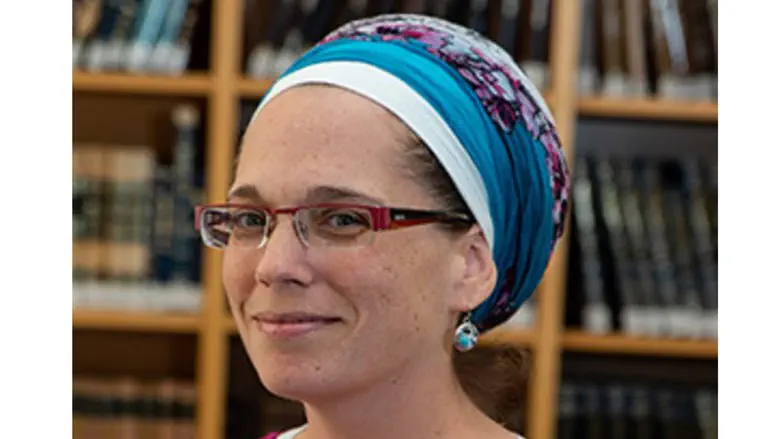
Adina Ellisis a graduate of the Matan Bellows Eshkolot Educators Institute. She has been teaching Tanakh and machshava over the last two decades, initially on college campuses and in Hebrew Schools in the New Jersey area. Since making aliyah in 2005, she has given weekly shiurim in Hebrew and English to women in her community. Adina has taught in the ALIT program and Rosh Chodesh seminars run by the OU Women's Initiative as well as in the mother-daughter "learn and art" program of OU Israel. She is known for her unique ability to facilitate in-depth textual learning along with engaging and relevant discussions. Adina lives with her husband and children in Yad Binyamin
In Israel, the month of Cheshvan is often colloquially referred to as the time “acharei hachagim,” literally, after the holidays. It is the time when people sigh a breath of relief from the semi-frenzied holiday season, with the hopes of entering some sense of routine normalcy. For some living in Israel, it signals the start of the academic year in universities. And for many, it’s kickoff time for the well-intended “New Year’s resolutions” from the previous months’ soul searching.
We all know that new habits are hard to start and harder to maintain, and many books have been written on the topic. James Clear, author of Atomic Habits, writes “It is your commitment to the process that will determine your progress.” He highlights the importance of taking action no matter how small or seemingly insignificant. Just as we might write off a habit and say “it’s just a drop in the bucket,” that tiny drop is infinitely more significant than no drop at all. The month of Cheshvan is known by our Sages as MarCheshvan. The word mar is found in a verse in Yishayahu (40:15)
– הֵן גּוֹיִם כְּמַר מִדְּלִי – The nations are but a drop in the bucket. MarCheshvan is about creating a minor change, a new habit, a tweak to build a more refined daily schedule. A tiny drop in the proverbial bucket is worth far more than we realize.
Each small improvement adds up over time; while a seemingly minor choice may seem insignificant, the cumulative effect can be powerful. BJ Fogg, author of Tiny Habits, shares a fundamental principle: Progress is achieved by focusing on tiny, consistent actions rather than aiming for rapid transformations (as appealing as that may sound!). He suggests linking the tiny new habit to an existing routine (anchor moment) and celebrating the new tiny behavior (a feeling he calls Shine).
In this month of Cheshvan we read parashat “Lech Lecha,” and as we are developing our new behavior patterns, we are also encouraged to “go for ourselves,” on individual journeys of our own. Sometimes in creating new habits we need to assess old patterns which are no longer serving us and only once we leave them behind can we create a new reality for ourselves.
In Bereishit (12:1) Hashem said to Avraham to go forth:
From your native land – מֵאַרְצְךָ. Assess cultural habits- what hobbies fill your spare time? Consider what influences your decisions on fashion, music, books and movies.
And from the place of your birth – וּמִמּוֹלַדְתְּךָ. What attributes do you chalk up to “nature”? Traits that you were seemingly born with and you’ve established in your mind that they can never be altered, immutably part of your DNA. Would you reconsider some of those labels?
And from your father’s house – וּמִבֵּית אָבִיךָ. We naturally follow family scripts that we observed or experienced in our childhood homes, often without paying attention to these patterns. Sometimes we act in fear of repeating the mistakes of previous generations. Can we take note of where we are replicating or avoiding emulating different models of behavior and assess if it is benefiting us?
Once we acknowledge these three factors which influence our habits and patterns we can create tiny and meaningful shifts. This is the act of walking, and moving forward one step at a time is an act of emunah. Rav Eyal Vered writes:
הליכה היא פעולה של אמונה. האדם ההולך נדרש לשחרר את הארציות שלו, את האחיזה בארץ, את המשקל היציב והבטוח, ולתת אימון בצעד הבא….האויב הגדול של ההתקדמות הוא ההרגל (אל שפת האמת, פרשת לך לך).
Walking is an act of faith. A person who is walking must release his physical hold on the earth, let go of his sense of stability and put trust in the next step forward …the great enemy of progress is habit.
Let us question our habits- our culture, assumed inborn traits, and familial patterns- so that we can advance in our personal life journeys. The 11th of Cheshvan is the day of Rachel Imenu’s passing. She too teaches us about being on the path, part of a process. She is buried “baderech” (Bereishit 35:19, 48:7), on the way, reminding us, however clichéd it might sound, that while the destination is important, it’s the journey that truly matters.
At the closing of the first Shabbat of “acharei hachagim,” there is a Chabad Lubavitch custom to say “And Yaakov went on his way”- וְיַעֲקֹב הָלַךְ לְדַרְכּוֹ – (Bereishit 32:2) as a reminder that it is time to walk, to move forward and progress in our routines and daily practices.
One step at a time,
One tiny habit at a time.
This MarCheshvan and beyond, remember that even a small drop can be a remarkable thing.